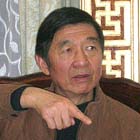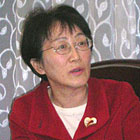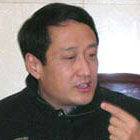The improvement of Sino-Japanese ties is one of the hot topics in the international community this year, represented by Chinese Premier Wen Jiabao's 'ice-melting' visit to Japan in April, the first China-Japan high-level economic dialogue this month, and Japanese Prime Minister Yasuo Fukuda's upcoming visit to China, etc.
Experts in international studies, including Wu Jianmin, President of China Foreign Affairs University (CFAU); Professor Yu Xintian, head of the Shanghai Institute for International Studies; and Wang Yizhou, fellow researcher at the World Economic and Political Studies Institute of the Chinese Academy of Social Sciences, shared their views at the CFAU's 51st Forum on December 5.

Wu Jianmin:
Sino-Japanese ties have improved continuously. Some critics opined that political and economic relations between China and Japan grew closer after the first China-Japan high-level economic dialogue recently.
I've told the press that the relationship between China and Japan would benefit from Yasuo Fukuda taking office as Japan's new Prime Minister. His father was once the prime minister and visited China. In other words, they are relatively familiar with the history and current situation in China. My idea has been echoed by many academics in China and proven to be true afterwards. His upcoming visit to China will boost Sino-Japanese ties; there will be much space for both sides to cultivate common interests.
What's more, both sides have raised proposals and detailed suggestions on how to enhance our mutually beneficial relationship. For instance, both sides could have further cooperation since Japan is the world's leading power in energy saving and environmental protection.

Yu Xintian:
China and Japan are neighbors. People from both sides should see clearly that the interdependence between China and Japan has become closer.
Both Prime Minister Yasuo Fukuda and Foreign Minister Masahiko Komura of Japan are trying to find out new ways to address Sino-Japanese relations. Mr. Komura used to visit our institute as a parliament man before taking office, hoping to help Shanghai in preparing the World Expo 2010. Japan has a lot of experience in organizing the World Expo, for Aichi was the host city of 2005. It's really gratifying to see many Japanese parliament men help Shanghai sincerely.
There remains much space for communication and dialogue. Strategy- and policy-making will play important roles in our bilateral relationship in the foreseeable future; more political mechanisms should be encouraged. For instance, the Chinese People's Liberation Army's naval missile destroyer Shenzhen visited Japan at the invitation of the Japanese Maritime Self-Defense Force; this opened a new page in the history of China-Japan defense exchange and military communications. Some even suggested that there should be a joint rescue and search service on the sea between China and Japan. In other words, the mutual trust mechanism that lays the cornerstone for further cooperation could be started with humanitarian aid.

Wang Yizhou:
Both sides should treasure the current cooperative relations and move forward. Both sides will achieve better results in foreign relations as well as high-level leaderships if they follow this idea.
